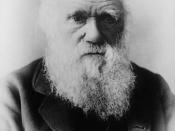Motivations are feelings or ideas that cause us to act toward a goal. There are four basic theories of motivation: instinct (evolutionary) theory, drive-reduction theory, arousal theory, and incentive theory.
Instinct theory refers to Darwin's influence that our genes incline us to act in ways that increases our change of survival. In other words, we behave a certain way because of our genetic composition. For example, whenever I'm in the car with my mom and she's makes turn quickly before a car passes by; I try to protect myself by raising my hands over my face. Even though my hands over my face wouldn't help if we were to get into an accident, I still unconsciously raise them. Psychologist who believe in the instinct theory would say that there is a predispose reason for me to have risen my hands, which would enhance my change of survival.
Drive-reduction theory refers to that our behavior is motivated by biological needs. An example of this is food. Whenever we are hunger, our body doesn't achieve homeostasis, or a balanced internal state. This is because our body is craving for some food, which means it is lacking something. This unbalanced internal state creates a need; whether it's heat, water, or food. For instance, whenever I'm hungry in school, I sometimes buy some candy from someone who is selling it. The need for food would be my primary drive. In order to achieve my primary drive, I would need money to pay for the candy, which would be my secondary drive.
Arousal theory refers to our tendency to seek for an optimum level of excitement. Each person has a different level of excitement. For some, they need little excitement to be motivated, for other it's different. In addition, most people do...


